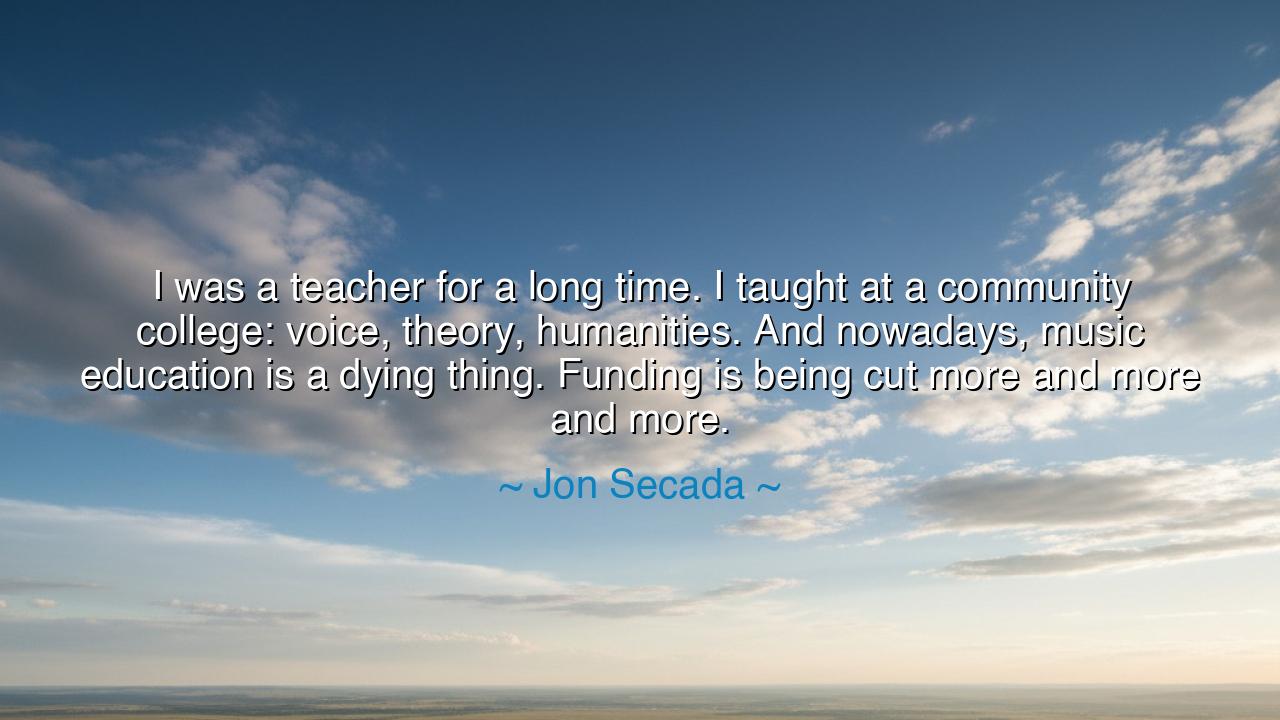
I was a teacher for a long time. I taught at a community
I was a teacher for a long time. I taught at a community college: voice, theory, humanities. And nowadays, music education is a dying thing. Funding is being cut more and more and more.






Hear, O children of the future, the lament and the wisdom in the words of Jon Secada: “I was a teacher for a long time. I taught at a community college: voice, theory, humanities. And nowadays, music education is a dying thing. Funding is being cut more and more and more.” These words are not spoken lightly; they are the cry of one who has seen the light of music education fade, though once it burned brightly in the hearts of the young. It is not only the story of one teacher, but the story of a culture that begins to forget the power of song, the depth of art, the soul of humanity itself.
To be a teacher of music is to shape voices and souls, not only to train technique but to awaken spirit. In teaching voice, theory, and humanities, Secada gave more than skills—he gave meaning, discipline, and the ability to understand the harmony of life itself. Music has always been more than sound; it is the language of the heart, the bridge between human beings and the eternal. When schools abandon music, they abandon a part of the human spirit. What is left is silence—not the sacred silence of meditation, but the empty silence of neglect.
Consider how ancient civilizations treated music. In Greece, Plato himself declared that musical training was essential for the development of the soul. The rhythms shaped character, the melodies nurtured harmony in the spirit. In China, Confucius taught that to govern well, rulers must first ensure music flourished, for music ordered the emotions of the people. The ancients knew what we forget: without music, the soul grows restless, the heart grows cold, and society loses its balance.
History shows us, too, the cost of neglect. When societies cut away the arts in pursuit of only profit and efficiency, they may become rich in coin but poor in spirit. In the 20th century, as wars ravaged nations, it was often music that sustained people in despair—soldiers sang in trenches, prisoners whispered hymns in camps, families gathered around pianos when all else was broken. To remove music from education is to rob future generations of one of the greatest tools of resilience and unity.
Secada’s lament is a warning: that funding cuts are not merely numbers on paper, but blows against the human spirit. When the young are denied music, they are denied a pathway to expression, to discipline, to beauty. A world that silences the arts raises generations skilled in calculation but starved of meaning. The soul cannot live on bread alone; it must also have song.
The lesson is clear: we must defend and restore music education. Support schools, teachers, and programs that keep art alive. Encourage children to sing, to play instruments, to listen not only with their ears but with their hearts. And if institutions fail, then let families and communities step forward—let the home become the music hall, the street become the stage, the gathering of friends become the choir. For even if the system forgets, the people must remember.
Practical wisdom follows: attend concerts at schools, donate instruments, advocate for funding, and most importantly, teach the young that music is not luxury but necessity. Sing with them, play with them, let them know that every voice has value. In this way, even in times of silence, the song will endure.
Thus, O children of tomorrow, remember Jon Secada’s cry. Music education is dying—but it will live if we choose to breathe life back into it. Do not let the world grow silent. For in music lies humanity, and in humanity lies hope. Guard it, cherish it, pass it on. For the people who keep their song alive can never truly perish.






AAdministratorAdministrator
Welcome, honored guests. Please leave a comment, we will respond soon